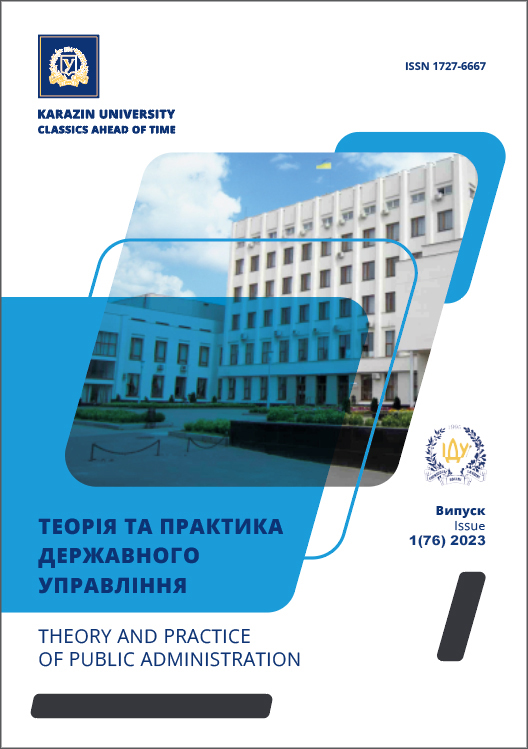Toolkit for Performing Public Control of Compliance with Labor Legislation
Abstract
In the article, through scientific abstraction, the concept of public control tools is defined as a set of means for realizing the goal of ensuring the rights, freedoms, and legitimate interests of individual citizens and society as a whole, which is carried out by public organizations, associations, and the population. Adapting the tools of control used in the management of organizations to the field of labor protection, it can be argued that public control in the field of labor protection can be carried out according to the legality of wage calculations, for which financial control tools can be used; part of the operational control tools can be involved in monitoring compliance with safety techniques at enterprises; individual quality control tools can be used in compliance with social labor conditions.
The toolkit of public control over compliance with labor legislation can be selected depending on the purpose of its implementation. The purpose of control may change, and depending on it, one or another toolkit is selected, it may be more extensive, or only certain tools may be used. Even when the purpose of control is the same, the individual tasks resulting from it, and accordingly, the tools, may differ. The results of public control may be demands from the subjects of such control both to employers with the aim of guaranteeing certain social standards, ensuring constitutional rights (preserving life, health, etc.), and to state control bodies with the aim of introducing such demands into the regulatory and legal field. That is, the tasks of public control are not only the detection of deviations from the observance of labor protection norms by controlled objects, it is much broader and reflects the influences and demands of civil society.
The article concludes that a civil society has been formed in Ukraine, whose institutions can take over certain functions of monitoring compliance with labor legislation, especially during martial law, when the risks of illegal actions on the part of employer’s increase.
Downloads
References
Bassanini A., Nunziata L. & Venn D. (2009). Occupational health and safety legislation and productivity growth in OECD countries. Economic policy, 58. 349–402.
Distelhorst H. (2023). Evaluating the social impact of corporations: evidence of management control intervention in the supply chain to increase workers’ wages. Journal of Accounting Research, 61(3). 855-890. URL: https://onlinelibrary.wiley.com/doi/10.1111/1475-679X.12472
Colfer, B., Harney, B., McLaughlin, K. & Wright, C.F. (2023). Protecting the future of work: new institutional mechanisms to protect labor standards. Protecting the future of work: new institutional mechanisms for protecting labor standards (the trade union movement). Emerald Publishing Limited, Bingley. 1-19. URL: https://www.emerald.com/insight/content/doi/ 10.1108/978-1-80071-248-520221002/full/html
Tool. Dictionary of foreign words. URL: https://www.jnsm.com.ua/cgi-bin/u/book/sis.pl?Qry=%B2%ED%F1%F2%F0%F3%EC%E5%ED%F2 [in Ukrainian].
Kosinov S. A. (2013). Forms and tools of public control. Law of Ukraine, 5. URL: https://pravoua.com.ua/ua/store/pravoukr/prvoukr_2013_5/ Kosinov_5_2013/ [in Ukrainian].
Krupnyk A.S. (2011). Public control. Encyclopedia of public administration: in 8 volumes / Nat. Acad. state example under the President of Ukraine; scientific-ed. board: Yu. V. Kovbasiuk (chairman) and others. - K.: NADU. Volume 1: Theory of public administration / scientific editor. board: V. M. Knyazev (co-chairman), I. V. Rozputenko (co-chairman) and others. 2011. 748. 113-115. [in Ukrainian].
Lebid A. E. & Nazarov M. S. (2020). Tools of public participation in Ukraine: educational and methodological manual. Sumy: Publishing House of Sumy State University. [in Ukrainian].
Nadtochii A. O. & Smaglyuk A. A. (2022). Peculiarities of regulation of social and labor relations in the conditions of martial law. Publichne upravlinnya KHKHI stolittya: v umovakh hibrydnykh zahroz : zb. nauk. mater. XKHII Mizhnar. nauk. konhresu. (рр.171- 174). KHARKIV: NNI «Instytut derzhavnoho upravlinnya» Kharkivs’koho natsional’noho universytetu imeni V.N. Karazina. [in Ukrainian].
OECD overview of corporate governance of state-owned enterprises: Ukraine, OECD. 2021. URL: http://www.oecd.org/corporate/soe-review-ukraine.htm. [in Ukrainian].
Pavlovskyi R. V. (2023). The specifics of public control over compliance with labor legislation. Public Administration of the XXIst Century: In Conditions of Hybrid Threats : Collected of scientific materials of the XXII-th International Scientific Congress. – Kharkiv:
Research and Educational Institute «Institute of Public Administration» of v.n. karazin kharkiv national university. URL: https://ipa.karazin.ua/wp-content/themes/education/filesforpages/science/zbirnuk_do_kogres2022.pdf [in Ukrainian].
Panasiuk V.M. (2019). Tools of public participation: concepts, types and constitutional and legal problems of application. Pravove zhyttya suchasnoyi Ukrayiny : u 2 t. : mater. nauk.-prakt. konf. (рр.320-322). Odesa : VD «Hel’vetyka», URL: http://dspace.onua.edu.ua/bitstream/handle/11300/21074/ [in Ukrainian].
Law of Ukraine оn the organization of labor relations under martial law № 2136-IX. (2022, March15). URL: https://zakon.rada.gov.ua/laws/show/2136-20#Text. [in Ukrainian].
Demining the territory of Ukraine. Ukrinfo, 2022, May 11. URL: https://www.ukrinform.ua/rubric-presshall/3479988-rozminuvanna-teritorii-ukraini.html [in Ukrainian].
Fomitska N.V. Myronova N.S. & Naboka L.V. (2012). Control in state institutions. Kharkiv: Publishing House of KhaRI NADU «Master». [in Ukrainian].
Copyright (c) 2023 Pavlovskiy R. V.

This work is licensed under a Creative Commons Attribution 4.0 International License.
Authors who publish with this journal agree to the following terms:
- Authors retain copyright and grant the journal right of first publication with the work simultaneously licensed under a Creative Commons Attribution License that allows others to share the work with an acknowledgement of the work's authorship and initial publication in this journal.
- Authors are able to enter into separate, additional contractual arrangements for the non-exclusive distribution of the journal's published version of the work (e.g., post it to an institutional repository or publish it in a book), with an acknowledgement of its initial publication in this journal.
- Authors are permitted and encouraged to post their work online (e.g., in institutional repositories or on their website) prior to and during the submission process, as it can lead to productive exchanges, as well as earlier and greater citation of published work (See The Effect of Open Access).

